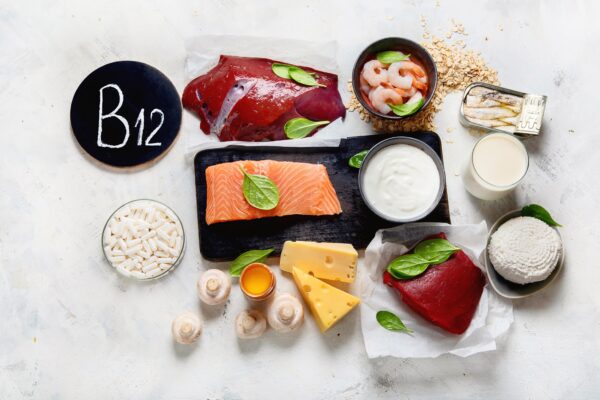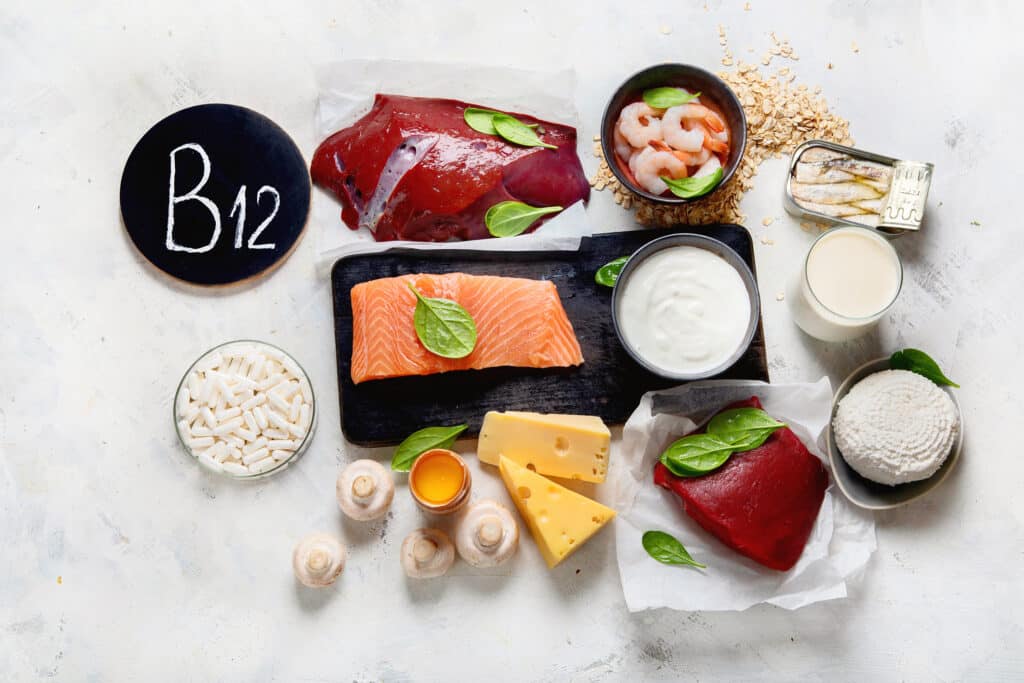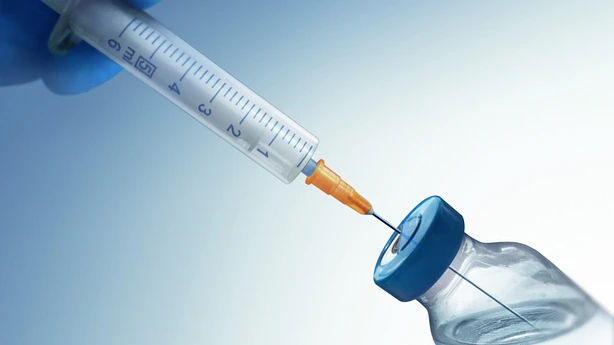
Top 12 Foods High in Vitamin B12 and Why You Should Add These to Your Diet

Written by: ADS Staff
Clinically Reviewed by: Halle Elbling, MS, RDN, CDCES
Everyone needs vitamin B12 in their diet – especially people living with diabetes. Like other essential nutrients, this vitamin plays a crucial role in your overall health, but your body can’t make it on its own. The good news: increasing your intake of this vitamin is easy. You can find B12 naturally in foods like meat, fish, poultry and dairy products, it can be added to other foods and is also available as a supplement.
Are you wondering what vitamin B12 does and what foods can help you get more of it? If so, you’re in the right place. Read on for the ADS guide to vitamin B12 and the best foods with B12.
Table of Contents
What is Vitamin B12?
Vitamin B12 and Diabetes
The Best Vitamin B12 Foods
Should You Take Vitamin B12 Supplements?
Frequently Asked Questions
What is Vitamin B12?
The nutrient known as vitamin B12 is an essential element in several bodily processes. Notably, this vitamin assists in the creation of DNA – the genetic material used in every one of your cells. Along with that, it is responsible for protecting the health of your blood and nerve cells and can lower your risk of megaloblastic anemia, a condition that can make you feel weak and tired.
Your daily recommended amount of vitamin B12 will increase slightly as you age. The amount of vitamin B12 people need also goes up during pregnancy and when breastfeeding:
| Stage of Life | Recommended Amount in Micrograms (mcg) |
| Newborn (birth-6 months) | 0.4 mcg |
| Infant (7-12 months) | 0.5 mcg |
| Child (1-3 years) | 0.9 mcg |
| Child (4-8 years) | 1.2 mcg |
| Child (9-13 years) | 1.8 mcg |
| Teenager (14-18 years) | 2.4 mcg |
| Adult (19+ years) | 2.4 mcg |
| Pregnancy | 2.6 mcg |
| Breastfeeding | 2.8 mcg |
Vitamin B12 and Diabetes
People with type 2 diabetes should know the risks associated with vitamin B12 deficiency. Metformin, a drug commonly used to treat this disease, might be connected to low levels of B12. A study from 2009 found that 22 percent of type 2 diabetes patients also had less of this vitamin than they needed and that the use of metformin may have been involved.
If you have type 2 diabetes, knowing the warning signs of low B12 levels is wise. Early symptoms often include:

- Low appetite
- Weakness and tiredness
- Pale or yellow skin
- Gastrointestinal (GI) issues like diarrhea, nausea and constipation
- Unexpected weight loss
Complications may arise when vitamin B12 deficiency goes untreated, potentially leading to serious health issues. Anemia and peripheral neuropathy, distinct from diabetic neuropathy, can develop if B12 levels remain low. If you experience symptoms such as fatigue, weakness, or tingling in extremities, consult your doctor for a blood test to assess B12 levels.
If left unaddressed, vitamin B12 deficiency can result in severe complications, including:
- Heart failure due to anemia
- Neurological damage
- Increased risk of gastric cancer
- Higher likelihood of developing an autoimmune disorder
Interestingly, both diabetes and vitamin B12 deficiency can independently contribute to neuropathy. In diabetes, prolonged periods of elevated blood sugar levels can lead to nerve damage. On the other hand, vitamin B12 plays a crucial role in maintaining healthy nerve function, and its deficiency can also lead to neuropathy.
Research from 2014 indicates that the coexistence of type 2 diabetes and vitamin B12 deficiency may exacerbate peripheral neuropathy, underscoring the importance of addressing both conditions.
Understanding the potential complications of B12 deficiency highlights the significance of incorporating foods rich in this essential nutrient into your diet. Let’s delve into the best sources of vitamin B12 to ensure optimal health and well-being.
The Best Vitamin B12 Foods
When you’re at an elevated risk of a B12 deficiency, eating foods rich in this vitamin may help. Some foods high in B12 include:
Clams
If you’re a seafood fan, you’re in luck – many types of aquatic life are packed with vitamin B12. That includes clams, which may be one of the best B12 sources, period. If you eat 20 small clams, you’ll get over 7,000 percent of your daily value (DV) of this vitamin.
Sardines
Sardines aren’t quite as B12-heavy as clams, but that doesn’t make them a bad choice if you want to get more of this vitamin. With a one-cup serving, you’ll get a whopping 554 percent of your DV for vitamin B12 (and significant amounts of almost any other nutrient you might need). For example, sardines are also good sources of omega-3 fatty acids, calcium and protein. Just be careful not to go overboard – the calories and sodium in sardines can cause problems for people living with diabetes who eat them in large amounts.
Tuna
Another popular, nutrient-rich fish is tuna, which can also add lots of B12 to your diet. To get 453 percent of your B12 DV, simply enjoy a 3.5-ounce serving of cooked tuna. Meanwhile, canned tuna has smaller (but still noteworthy) amounts of this vitamin.
Trout
When you’re running low on B12, it may be time to “taste the rainbow” – the rainbow trout, that is. This is one of the healthiest seafood options available, and a 3.5-ounce serving contains 312 percent of your DV for B12. Some of the other vital nutrients it contains are phosphorus and selenium.

Salmon
Along with being a great source of omega-3 fatty acids, and protein, salmon can help you meet your B vitamin needs. Cook up a half filet of this fish to get 208 percent of your B12 DV.
Seaweed/Nori
It may not technically count as “seafood,” but seaweed is still a solid source of vitamin B12. But don’t expect it to be as nutrient-dense as some foods on this list – you’ll need to eat four grams to hit your DV of B12.
Beef
Would you prefer to focus on more traditional meats? Beef is a solid choice since a grilled flat iron steak contains 467 percent of your DV for B12. Maximize your B12 intake by looking for low-fat cuts and roasting or grilling your meat.
Eggs
You don’t need to wait until dinner to start getting the vitamins you need. You’ll get 46 percent of your B12 DV right away by eating two large eggs for breakfast. Keep in mind that egg yolks have more B12 than egg whites, and it’s easier for your body to absorb the B12 found in the yolks.
Fortified Cereal
Eggs aren’t the only way to get B12 at the breakfast table. Fortified cereal can also help you get a head-start – while exact values vary by brand, a cup of Malt-O-Meal Raisin Bran contains 62 percent of your DV for B12. (Of course, cereal is also a source of carbs. Take care to eat fortified cereal in moderation, and check nutrition labels to avoid brands that are full of added sugars.)
Milk and Dairy Products
Nothing goes better with cereal than milk, and a cup of whole milk will give you 46 percent of your B12 DV. You can also find vitamin B12 in cheese and yogurt. Be sure to watch the fat and calories in these products.
Fortified Non-Dairy Milk
Are you lactose-intolerant, vegan, or just not a fan of traditional dairy products? If so, consider fortified non-dairy alternatives. A cup of fortified soy milk can deliver 86 percent of your DV for B12, and fortified almond and rice milk brands are also available.
Fortified Nutritional Yeast
Nutritional yeast lives up to its name – it’s full of vegan protein, minerals, and vitamins. While this yeast doesn’t contain vitamin B12 on its own, it’s often fortified. Two tablespoons of fortified nutritional yeast can provide 733 percent of your B12 DV.

Should You Take Vitamin B12 Supplements?
Not everyone who has diabetes has a vitamin B12 deficiency. In many cases, people with diabetes can meet their B12 DV through their diet alone. However, some people with diabetes and others at risk of vitamin B12 deficiency can benefit from taking B12 as a supplement.
Vitamin B12 supplements are available in all kinds of forms. Depending on your preference, you can find supplements you can swallow, chew, or drink to support your B12 consumption. You might also be able to schedule a B12 injection, which is just as effective as taking B12 orally. Contact your physician regarding using supplements of B12.
Frequently Asked Questions
What Foods Are High In B12?
Many different foods are rich in vitamin B12. This vitamin is commonly found in animal products, especially seafood and red meat. Additionally, fortified foods and dietary supplements are reliable sources of vitamin B12.
What Are The Symptoms of Needing Vitamin B12?
If you have low levels of vitamin B12, you may notice symptoms such as weakness, constipation, tiredness, weight loss, and limited appetite. Later complications include anemia and neuropathy.
The Bottom Line
The risk of vitamin B12 deficiency may not be an obvious threat to people living with diabetes, but you should take it seriously. You can lower your risks by eating right, and informing your doctor of any symptoms that could indicate low levels of B12. And like always, be sure to talk to your healthcare team before making major changes to your diabetes meal plan.
If you need any diabetes supplies while treating low B12 levels, ADS can help. Get started by looking at our continuous glucose monitors, glucose meters, diabetes testing supplies, and insulin pumps.
